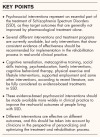Evidence-based psychosocial interventions in schizophrenia: a critical review
- PMID: 38410981
- PMCID: PMC10990032
- DOI: 10.1097/YCO.0000000000000925
Evidence-based psychosocial interventions in schizophrenia: a critical review
Abstract
Purpose of review: Schizophrenia Spectrum Disorders (SSD) are severe conditions that frequently produce significant impairment in cognitive performance, social skills and psychosocial functioning. As pharmacological treatment alone often provides only limited improvements on these outcomes, several psychosocial interventions are employed in psychiatric rehabilitation practice to improve of real-world outcomes of people living with SSD: the present review aims to provide a critical overview of these treatments, focusing on those that show consistent evidence of effectiveness.
Recent findings: Several recent systematic reviews and meta-analyses have investigated in detail the acceptability, the effectiveness on several specific outcomes and moderators of response of different psychosocial interventions, and several individual studies have provided novel insight on their implementation and combination in rehabilitation practice.
Summary: Cognitive remediation, metacognitive training, social skills training, psychoeducation, family interventions, cognitive behavioral therapy, physical exercise and lifestyle interventions, supported employment and some other interventions can be fully considered as evidence-based treatments in SSD. Psychosocial interventions could be of particular usefulness in the context of early intervention services. Future research should focus on developing newer interventions, on better understanding the barriers and the facilitators of their implementation in clinical practice, and exploring the opportunities provided by novel technologies.
Copyright © 2024 The Author(s). Published by Wolters Kluwer Health, Inc.
Conflict of interest statement
Similar articles
-
Interventions to improve safe and effective medicines use by consumers: an overview of systematic reviews.Cochrane Database Syst Rev. 2014 Apr 29;2014(4):CD007768. doi: 10.1002/14651858.CD007768.pub3. Cochrane Database Syst Rev. 2014. PMID: 24777444 Free PMC article.
-
Physiotherapist-delivered cognitive-behavioural interventions are effective for low back pain, but can they be replicated in clinical practice? A systematic review.Disabil Rehabil. 2018 Jan;40(1):1-9. doi: 10.1080/09638288.2016.1236155. Epub 2016 Nov 21. Disabil Rehabil. 2018. PMID: 27871193
-
Cognitive behavioural therapy (group) for schizophrenia.Cochrane Database Syst Rev. 2022 Jul 12;7(7):CD009608. doi: 10.1002/14651858.CD009608.pub2. Cochrane Database Syst Rev. 2022. PMID: 35866377 Free PMC article.
-
Survivor, family and professional experiences of psychosocial interventions for sexual abuse and violence: a qualitative evidence synthesis.Cochrane Database Syst Rev. 2022 Oct 4;10(10):CD013648. doi: 10.1002/14651858.CD013648.pub2. Cochrane Database Syst Rev. 2022. PMID: 36194890 Free PMC article.
-
Falls prevention interventions for community-dwelling older adults: systematic review and meta-analysis of benefits, harms, and patient values and preferences.Syst Rev. 2024 Nov 26;13(1):289. doi: 10.1186/s13643-024-02681-3. Syst Rev. 2024. PMID: 39593159 Free PMC article.
Cited by
-
Pharmacological Treatment of Cognitive Impairment Associated With Schizophrenia: State of the Art and Future Perspectives.Schizophr Bull Open. 2024 May 23;5(1):sgae013. doi: 10.1093/schizbullopen/sgae013. eCollection 2024 Jan. Schizophr Bull Open. 2024. PMID: 39144119 Free PMC article.
-
Qualitative Evaluation of Acceptability and Feasibility of a Behavioral Intervention to Reduce Violence Among Young Adults with Early Psychosis.Community Ment Health J. 2025 Jan;61(1):193-202. doi: 10.1007/s10597-024-01343-x. Epub 2024 Aug 22. Community Ment Health J. 2025. PMID: 39172311
-
Is ketamine efficacious for rapid treatment of acute suicidal ideation in an emergency setting? Lessons learned from a pilot randomized controlled trial.BMC Res Notes. 2025 Feb 12;18(1):65. doi: 10.1186/s13104-024-07029-7. BMC Res Notes. 2025. PMID: 39940002 Free PMC article. Clinical Trial.
-
The Relationship between Cognitive Impairment and Violent Behavior in People Living with Schizophrenia Spectrum Disorders: A Critical Review and Treatment Considerations.Medicina (Kaunas). 2024 Aug 3;60(8):1261. doi: 10.3390/medicina60081261. Medicina (Kaunas). 2024. PMID: 39202542 Free PMC article. Review.
-
Establishment and Maintenance of a Digital Therapeutic Alliance in People Living With Negative Symptoms of Schizophrenia: Two Exploratory Single-Arm Studies.JMIR Ment Health. 2025 Jan 27;12:e64959. doi: 10.2196/64959. JMIR Ment Health. 2025. PMID: 39869902 Free PMC article. Clinical Trial.
References
-
- Galderisi S, Rucci P, Mucci A, et al. . The interplay among psychopathology, personal resources, context-related factors and real-life functioning in schizophrenia: stability in relationships after 4 years and differences in network structure between recovered and nonrecovered patients. World Psychiatry 2020; 19:81–91. - PMC - PubMed
-
- Dong M, Lu L, Zhang L, et al. . Quality of life in schizophrenia: a meta-analysis of comparative studies. Psychiatr Q 2019; 90:519–532. - PubMed
Publication types
MeSH terms
LinkOut - more resources
Full Text Sources
Medical
Research Materials


